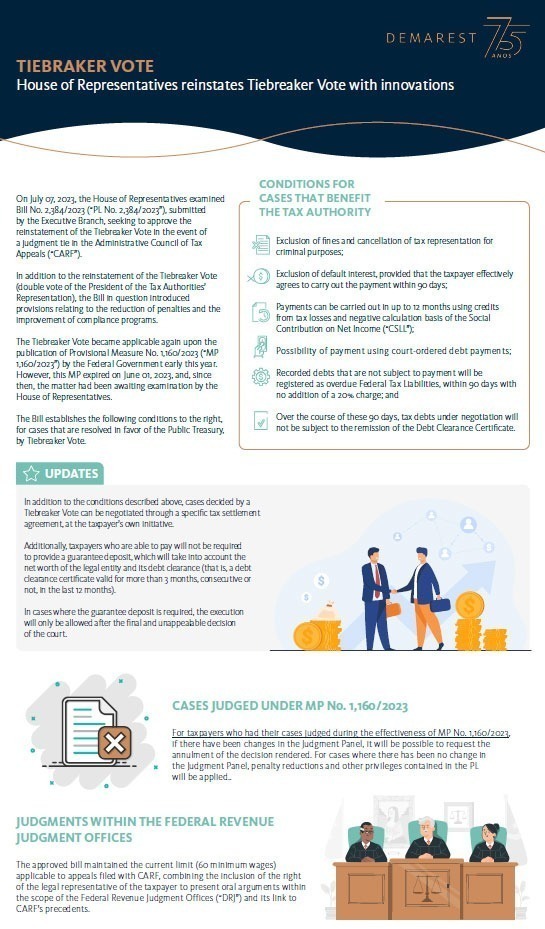Insights > Client Alerts
Client Alerts
House of Representatives reinstates Tiebreaker Vote with innovations
July 10th, 2023

CLICK HERE AND CHECK OUR INFOGRAPHIC ABOUT THIS TOPIC
On July 07, 2023, the House of Representatives examined Bill No. 2,384/2023 (“PL No. 2,384/2023”), submitted by the Executive Branch, seeking to approve the reinstatement of the Tiebreaker Vote in the event of a judgment tie in the Administrative Council of Tax Appeals (“CARF”).
In addition to the reinstatement of the Tiebreaker Vote (double vote of the President of the Tax Authorities’ Representation), the Bill in question introduced provisions relating to the reduction of penalties and the improvement of compliance programs.
CONDITIONS FOR CASES THAT BENEFIT THE TAX AUTHORITY
The Tiebreaker Vote became applicable again upon the publication of Provisional Measure No. 1,160/2023 (“MP 1,160/2023”) by the Federal Government early this year. However, this MP expired on June 01, 2023, and, since then, the matter had been awaiting examination by the House of Representatives.

The Bill establishes the following conditions to the right, for cases that are resolved in favor of the Public Treasury, by Tiebreaker Vote.
- Exclusion of fines and cancellation of tax representation for criminal purposes;
- Exclusion of default interest, provided that the taxpayer effectively agrees to carry out the payment within 90 days;
- Payments can be carried out in up to 12 months using credits from tax losses and negative calculation basis of the Social Contribution on Net Income (“CSLL”);
- Possibility of payment using court-ordered debt payments;
- Recorded debts that are not subject to payment will be registered as overdue Federal Tax Liabilities, within 90 days with no addition of a 20% charge; and
- Over the course of these 90 days, tax debts under negotiation will not be subject to the remission of the Debt Clearance Certificate.
UPDATES
In addition to the conditions described above, cases decided by a Tiebreaker Vote can be negotiated through a specific tax settlement agreement, at the taxpayer’s own initiative.
Additionally, taxpayers who are able to pay will not be required to provide a guarantee deposit, which will take into account the net worth of the legal entity and its debt clearance (that is, a debt clearance certificate valid for more than 3 months, consecutive or not, in the last 12 months).
In cases where the guarantee deposit is required, the execution will only be allowed after the final and unappealable decision of the court.
CASES JUDGED UNDER MP No. 1,160/2023
For taxpayers who had their cases judged during the effectiveness of MP No. 1,160/2023, if there have been changes in the Judgment Panel, it will be possible to request the annulment of the decision rendered. For cases where there has been no change in the Judgment Panel, penalty reductions and other privileges contained in the PL will be applied.
JUDGMENTS WITHIN THE FEDERAL REVENUE JUDGMENT OFFICES
The approved bill maintained the current limit (60 minimum wages) applicable to appeals filed with CARF, combining the inclusion of the right of the legal representative of the taxpayer to present oral arguments within the scope of the Federal Revenue Judgment Offices (“DRJ”) and its link to CARF’s precedents.
REDUCTION OF PENALTIES
The Bill under discussion provides for changes in the application of fines when there is an ex-officio assessment.
![]()
As for the 75% Ex-officio Fine, it will be reduced by 1/3 in cases where:
- an excusable error by the taxpayer is found, whose behavior demonstrates efforts to ensure the proper fulfillment of the tax obligation;
- the ex-officio assessment arises from diverging interpretations of the legislation governing the tax obligation; and
- the taxpayer has acted in accordance with repeated practices adopted by the government or the market segment in which it operates.
![]()
As for the 150% Qualified Fine, it would only be applied in the event of a recurrence of willful misconduct, two years after the ex-officio assessment in which the action or omission relating to such tax offenses was attributed.
In addition, the qualified fine will be dismissed in cases where:
- willful misconduct relating to the tax offenses has not been established, individualized and proven;
- there is a criminal judgment for the acquittal of the taxpayer from authorship, materiality or intent in a proceeding for which the taxpayer was criminally charged;
- the taxpayer has disclosed the acts or facts that gave rise to the imposition of the fine; and
- the taxpayer adopts measures to remedy the actions or omissions typified above, during the course of the inspection.
TAX COMPLIANCE AND TRANSACTION
- As previously mentioned, the Bill presents guidelines aimed at encouraging tax compliance by determining that the Federal Revenue Office must provide preventive methods for the self-regularization of main and ancillary obligations.
- Taxpayers with debts registered as overdue can carry out a Tax Transaction with the Attorney General for the National Treasury (“PGFN”), which offers discounts of up to 65% on the amount of debt, and with a maximum payment term of up to 120 months.
- For individuals, micro and small businesses, the Tax Transaction offers discounts of up to 70% on the amount of debt, and with a maximum payment term of up to 145 months.
- Finally, if converted into law, the Bill also provides that, within a period of three months from the date of publication of the regulation, taxpayers will be allowed to confess and pay (in cash or in installments) the federal taxes due and not yet collected, even after the inspection procedure has been initiated, with the exemption of default and ex-officio penalties.
Demarest’s Tax team is available to provide any further clarifications that may be necessary.






















